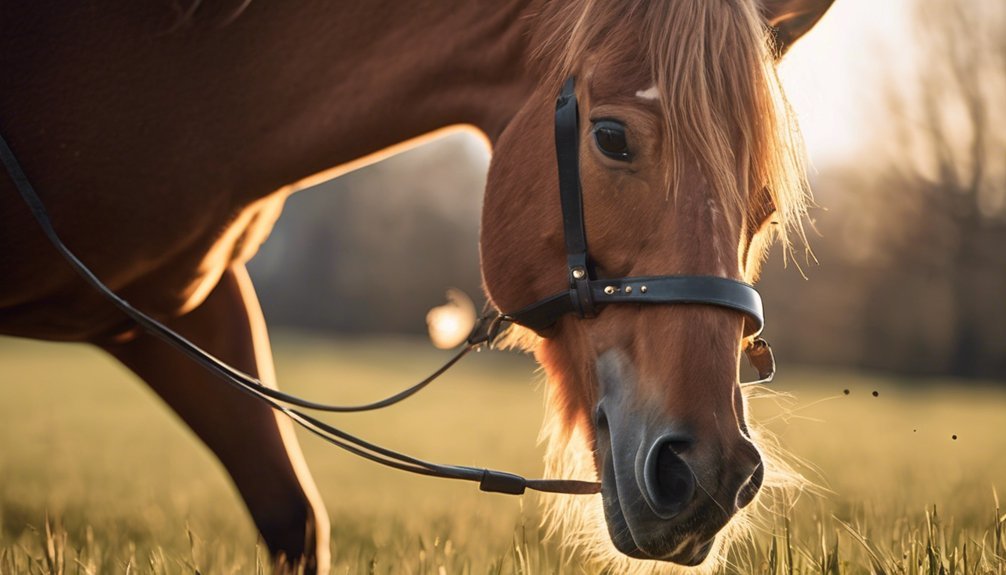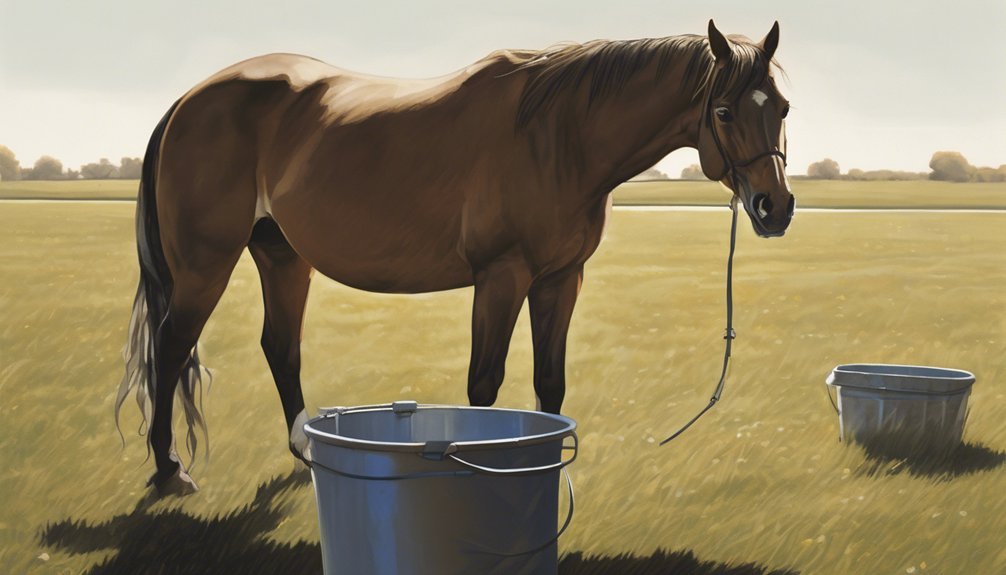
Many horse owners underestimate how deeply stress can alter their horse's nutritional needs. When a horse experiences stress, its metabolism can ramp up, leading to a demand for more calories and nutrients. This shift can also affect their appetite, causing some to eat less while others may overeat. Understanding these changes is essential for maintaining your horse's health. So, how do you ensure your horse's diet meets these evolving requirements?
Key Takeaways
- Stress increases a horse's metabolic rate, requiring more calories and nutrients to maintain health and performance.
- Changes in appetite, whether increased or decreased, can signal emotional distress and necessitate dietary adjustments.
- Providing steady access to forage promotes digestion and comfort, helping to alleviate stress-related issues.
- Incorporating high-quality grains and calming supplements can support energy levels and reduce anxiety in stressed horses.
- Regular monitoring of weight, coat condition, and energy levels is essential to adjust nutritional plans effectively for stressed horses.
Understanding Stress in Horses

When you think about stress in horses, it's essential to recognize that their emotional and physical well-being is closely intertwined.
Understanding stress triggers, such as changes in environment, loud noises, or separation from companions, can help you identify potential sources of anxiety.
You'll notice behavioral signs like excessive cribbing, pacing, or a reluctance to interact, which indicate that your horse is struggling.
By paying close attention to these cues, you can take proactive steps to alleviate stress before it escalates.
Creating a calm, consistent environment allows your horse to feel secure, fostering a healthier emotional state.
How Stress Impacts Metabolism
Stress not only affects a horse's emotional well-being but also significantly impacts its metabolism. When your horse is under stress, its metabolic rate can increase, leading to heightened energy expenditure. This means your horse might need more calories and nutrients to maintain its health and performance.
| Stress Level | Metabolic Rate Change | Energy Expenditure |
|---|---|---|
| Low | Stable | Baseline |
| Moderate | Increased | Elevated |
| High | Significantly Increased | Very High |
| Chronic | Variable | Depleted |
| Recovery | Gradual Decrease | Normalizing |
Understanding these changes is crucial to ensure your horse receives the right nutrition, helping it cope better with stress and thrive in its environment.
Changes in Appetite and Eating Behavior

Although it may not be immediately obvious, changes in a horse's appetite and eating behavior can be one of the first signs of stress.
When your horse experiences stress, you might notice significant appetite changes—some may eat less, while others may overeat as a coping mechanism. These shifts in eating habits can affect their overall health and wellbeing, manifesting in weight loss or gain.
It's essential to observe your horse closely; even subtle changes could indicate deeper emotional distress. By recognizing these signs early, you can address potential stressors in their environment and work to restore their normal eating patterns.
Nutritional Adjustments for Stressed Horses
As you navigate the challenges of caring for a stressed horse, making nutritional adjustments becomes crucial to support their wellbeing.
Focus on stress management through tailored nutrition and dietary supplementation. Consider these key adjustments:
- Increase forage: Ensure a steady supply of hay to promote digestion and comfort.
- Add high-quality grains: Boost energy levels and overall nutrition with easily digestible grains.
- Incorporate calming supplements: Look for magnesium or herbal blends that can help soothe anxiety.
- Monitor hydration: Stress can lead to decreased water intake, so provide fresh, clean water frequently.
These changes can make a significant difference in your horse's response to stress.
Monitoring and Supporting Nutritional Health

Monitoring your horse's nutritional health is vital, especially after implementing adjustments to manage stress. Regular nutritional monitoring helps you assess how your horse is responding to dietary changes.
Keep an eye on their weight, coat condition, and energy levels, as these indicators reflect their overall well-being.
Consider diet supplementation tailored to your horse's specific needs. Vitamins and minerals can significantly enhance their nutritional profile and help alleviate stress-related deficiencies.
Collaborate with your veterinarian or an equine nutritionist to create a balanced plan.
Frequently Asked Questions
Can Stress Cause Dental Issues in Horses?
Yes, stress can lead to dental issues in horses. You might notice stress symptoms like grinding teeth or reluctance to eat. Prioritizing your horse's dental health can help mitigate these problems and improve overall well-being.
How Does Stress Affect a Horse's Hydration?
When stress strikes, it's like a drought in your horse's world; hydration levels plummet. Stress impacts their thirst and water absorption, leaving them parched. You must ensure they stay hydrated to thrive and feel secure.
Are Certain Breeds More Susceptible to Stress-Related Nutritional Changes?
Certain breeds do show more susceptibility to stress-related nutritional changes. Understanding your horse's unique stress response helps you tailor their diet effectively, ensuring they receive the proper nutrients to thrive during challenging times.
What Role Does Exercise Play in a Stressed Horse's Nutrition?
When you consider a stressed horse, exercise intensity significantly influences its nutritional timing. Adequate nutrition supports recovery, while timing meals around exercise ensures optimal energy levels, helping your horse cope with stress more effectively.
Can Supplements Help Mitigate Stress-Related Nutritional Deficiencies?
Supplements can definitely help address stress-related nutritional deficiencies. They improve nutrient absorption and often include calming herbs, which soothe your horse and support overall well-being, ensuring they receive the essential nutrients they need during stressful times.
Conclusion
In the grand tapestry of equine care, stress is a thread that can unravel a horse's nutritional balance. By recognizing how stress alters metabolism and appetite, you can take proactive steps to ensure your horse remains healthy and vibrant. Adjusting their diet and monitoring their well-being not only supports their physical needs but also nurtures their emotional stability. Remember, a well-fed horse is a happy horse, and your attentive care can make all the difference in their world.





